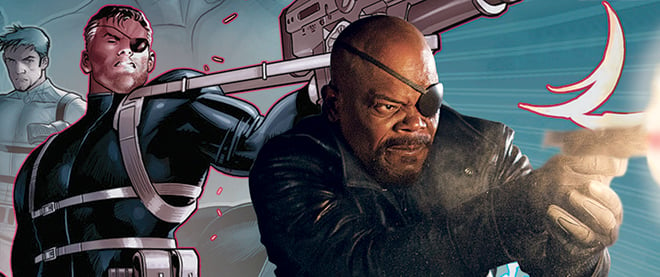Hey, didn’t he used to be an old white guy?
A black Nick Fury isn’t the only comic-book character to be changed by the movies
Share

Spider-Man was dead in the comic books, and now he’s coming back to life. Though Marvel Comics got angry letters, and even death threats, for killing the comics icon over a year ago, the company always planned to revive him when the time was right. And the right time happens to be this April, just before the release of the movie The Amazing Spider-Man 2. Axel Alonso, editor-in-chief of Marvel, says the story by Spider-Man writer Dan Slott “was dovetailing to a close, and this seemed like the right time, when people are talking about Spider-Man, to pull the trigger.” And while there was no mandate from the movie producers that they had to, “we chose to have it coincide because we thought it was good timing.” Being in comics today means managing a lot of those coincidences.
Many people have noticed how movies have changed comic-book costumes, which now look more practical and less like underwear. But more than costumes, the movies are influencing characterizations. Chris Ely, a writer for Geek League of America, points to “the Hulk’s involvement as a full-time Avenger.” In the comics, the character quit that team after two issues, but his popularity in the Avengers movie caused him to be written back in and lose his old status as a loner.
Other comics have imported characters who were created for films, such as Agent Coulson from the Marvel movies. And sometimes, the movie influence can add a little more diversity to a comic-book cast, but in complicated ways: The old, white version of the Nick Fury character in Marvel comics has given way to his long-lost black son, Nick Fury Jr. “He’s based on the movie version played by Samuel L. Jackson, who was based on an alternative-universe version, who, in turn, was based on Samuel L. Jackson and the original Nick Fury,” explains Comics Alliance writer Chris Sims. “It’s a complicated process.”
Alonso finds these changes make comics less forbidding for new readers. “We feel that it’s very important that we provide a sort of a portal by which people who go to the Cineplex can come to our comics,” he explains. “For me, it’s important that, when people go and see the Avengers movie and they come to the comics, they ?nd an accessible story where the characters bear some resemblance, tonally and aesthetically, to what they’ve seen in the movies.”
That technique can backfire sometimes: “What works in a comic book doesn’t necessarily work as a movie or TV show, and vice versa,” says Zack Smith, a writer for the comics site Newsarama. He adds that, if a movie doesn’t do well, comics wind up stuck with ideas that don’t work. When the movie Superman Returns came out, DC Comics used some of its ideas, such as the “crystal-based Krypton,” only to have them “revised out of existence” after the movie under-performed.
Comic-book companies are also aware that moviegoers don’t usually become regular comic buyers. Alonso says there’s “a window of time in which attention paid to a character has an effect on the traffic in stores. I think it’s something like a three-month window.” In the long run, though, comics depend on loyal readers, who have different tastes from the audience for films. Comics such as Iron Man are not top sellers, despite their movie visibility, and some of the bestselling comics do things the movies wouldn’t try: Superior Spider-Man, about an arch-villain’s attempt to take over for the dead Peter Parker, is one of Marvel’s biggest successes, even though Peter’s resurrection is causing it to be discontinued.
Still, Ely thinks that, overall, “this kind of synergy can only help the business across all media,” and sometimes, movie tie-ins can help a comic character even when the movie isn’t out yet. Guardians of the Galaxy, a second-tier Marvel property, has a movie coming out this summer; Alonso says that made it “wise for us to start to build those characters up in the comics,” and the new attention and promotion has resulted in Guardians becoming a bestselling comic for the first time. Movie synergy may not be all a comic needs to succeed. But it doesn’t hurt.